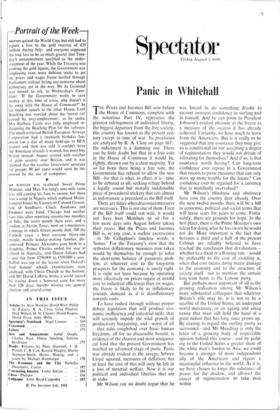Panic in Whitehall
THE Prices and Incomes Bill now before the House of Commons, complete with the notorious Part IV, represents the greatest infringement of individual liberty, the biggest departure from the free society, this country has known in the present cen- tury except in time of war. Its provisions are analysed by R. A. Cline on page 167: the indictment is a damning one. There can be little doubt but that in a free vote in the House of Commons it would be, rightly, thrown out by a clear majority. Yet so far from there being a free vote, the Government has refused to allow the new Bill—for that is what, in effect, it is—time to be debated at all, seeking refuge behind a legally sound but morally indefensible piece of procedural trickery that sets almost as unfortunate a precedent as the Bill itself.
There are times when draconian measures are necessaty. This is not one of them. Even if the Bill itself could not wait, it would not have hurt Members to sit for a few more days into August before taking their recess. But the Prices and. Incomes Bill is, in any case, a useless excrescence —in Mr Callaghan's timeless words, a `bonus.' For the Treasury's view that the orthodox deflationary measures now taken would by themselves be enough to solve the short-term balance of payments prob- lem, at whatever cost to the long-term prospects for the economy, is surely right. It is right not least because by operating more effectively on prices (again at untold cost to industrial efficiency) than on wages, the freeze is likely to be as inflationary towards demand as it is disinflationary towards costs.
To have rushed through without proper debate legislation that will produce eco- nomic inefficiency and industrial strife, that will seriously impede the vital growth, of productivity bargaining, and—worst of all —that rides roughshod over basic human freedoms, all for no discernible benefit, is evidence of the clearest and most unequivo- cal kind that the present Government has reached an advanced stage of panic. Panic was already evident in the savage, Selwyn Lloyd squared, measures of deflation; but at least the cost of this will only be felt in a loss of material welfare. Now it is our political and individual liberties that are at stake.
Mr Wilson can no doubt argue that he was forced to do something drastic to recover overseas confidence in sterling and in himself. And he can point to President Johnson's evident pleasure at the freeze as a measure of the success it has already achieved. Certainly, we have much to learn from the Americans. But is it really to be suggested that any assistance they may give us is conditional on our accepting a degree of regimentation they would not dream of tolerating for themselves? And if so, is that assistance worth having? Can long-term confidence ever repose in a Government that resorts to panic measures that can only store up more trouble for the future? Can confidence ever be regained for a currency that is manifestly overvalued?
Mr Wilson's blindness and obstinacy have cost the country dear already. Over the next twelve months there will be a bill in economic; political and social terms that will leave scars for years to come. Fortu- nately, there are grounds for hope. In the first place, there is the Prime Minister's own talent for doing what he has sworn he would not do. More important is the fact that between a third and a half of the present Cabinet are reliably believed to have reached the conclusion that devaluation— whether to a fixed or a floating rate—would be preferable to the cost of avoiding it, when that cost means doing major damage to the economy and to the structure of society itself—not to mention the certain long-term harm to the Labour party. • But perhaps most important of all is the growing realisation among Mr Wilson's more substantial colleagues that whatever Britain's role may be, it is not to be a satellite of the United States, an underpaid world mercenary, or an ageing and ailing nanny that must still hold the hand of a great nation that has long since grown up. By ceasing to regard the sterling parity as sacrosanct—and Mr Maudling is only the latest of a growing body of respectable opinion behind this course—and by yield- ing to the United States a greater share of the white man's burden in Asia, we could become a stronger (if more independent) ally of the Americans and regain a meaningful influence in the world. As it is, we have chosen to forgo the substance of power for the shadow, and allowed the cancer of regimentation to take root within.





























 Previous page
Previous page